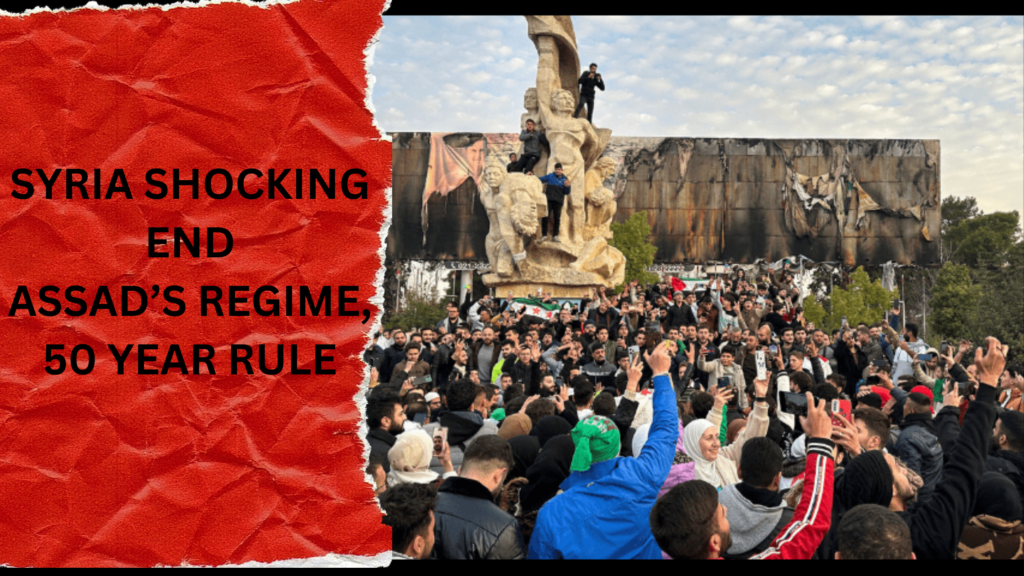The Bashar al-Assad family has been at the helm of Syria’s political landscape for over five decades. Initially, from Hafez al-Assad’s rise to power in 1970 to Bashar al-Assad’s current regime, their governance has shaped the country’s trajectory. However, it has often been under scrutiny and international criticism. Recent developments suggest that this long-standing rule might soon come to an abrupt end, with significant implications for Syria’s future. In this article, we delve into the latest updates, the factors driving these changes, and the possible scenarios awaiting Syria post-Bashar’s rule.
The Assad Legacy: In Syria A Brief Overview
The Bashar al-Assad dynasty began when Hafez al-Assad seized power through a coup in 1970. His presidency marked a period of authoritarian rule, centralized power, and heavy-handed control over dissent. Upon his death in 2000, his son Bashar al-Assad succeeded him, promising reforms but delivering an era of heightened conflict and repression.
The Civil War, which began in 2011 following peaceful protests, has been the defining chapter of Bashar al-Assad’s rule. Accusations of war crimes, the use of chemical weapons, and devastating humanitarian crises have marred his presidency. Despite these, the Bashar al-Assad regime has retained control over significant portions largely due to support from allies like Russia and Iran.
The Recent Turn of Events (Bashar al-Assad)
Reports now indicate that Bashar al-Assad’s grip on power could crumble within days. Surprisingly, this unprecedented shift is driven by several factors:
1. Internal Dissension Assad Regime
Recent leaks suggest growing dissent within Bashar’s inner circle. In particular, key officials and military leaders have allegedly begun questioning his leadership. As a result, speculation about a potential coup or resignation has started to gain momentum.
2. Economic Collapse
Syria’s economy is in shambles, with skyrocketing inflation, devaluation of the Syrian pound, and widespread poverty. Public discontent has reached a boiling point, with protests erupting in cities traditionally loyal to the regime, such as Suweida.
3. International Isolation
Western sanctions, such as the Caesar Act, have further crippled Syria’s economy. Moreover, recent geopolitical shifts have weakened Bashar’s external support. Russia, preoccupied with its conflict in Ukraine, and Iran, facing its internal challenges, seem less committed to propping up the regime.
4. Opposition Momentum
The fragmented opposition, which has long struggled to unify, however, now appears to be regaining strength. Notably, reports of increased coordination between political factions and armed groups have consequently raised hopes of a formidable challenge to Assad’s rule.

What Lies Ahead for Syria? As the Assad Era
Appears to near its conclusion, the question arises: what comes next for Syria? Here are some potential scenarios:
1. A Power Vacuum
A sudden departure of Assad could lead to a dangerous power vacuum. With multiple factions vying for control, the country risks further fragmentation and instability.
2. Transition to Democracy of Asssad
Optimistically, Assad’s exit could pave the way for a democratic transition. However, this would require significant international mediation and a robust framework to address the needs of Syria’s diverse population.
3. Increased Foreign Influence
Neighboring countries and global powers might seek to fill the void left by Bashar’s. While this could stabilize some regions, it may also lead to proxy conflicts, prolonging Syria’s suffering.
4. Humanitarian Challenges
Regardless of the political outcome, Syria faces monumental challenges in rebuilding its infrastructure, repatriating refugees, and addressing the trauma of its people.
The Role of the International Community In Syria
The international community will play a critical role in shaping Syria’s future. Key priorities include:
- Humanitarian Aid: Immediate relief for Syria’s population, including food, shelter, and medical assistance.
- Conflict Resolution: Facilitating dialogue between factions to avoid further bloodshed.
- Reconstruction Support: Economic assistance to rebuild Syria’s devastated cities and infrastructure.
- Accountability: Ensuring that war crimes and human rights abuses are investigated and prosecuted.
The ABC News Updated: The 50 Year of regime of Bashar’s family.
Conclusion
The potential end of the Assad family’s 50-year rule marks a pivotal moment in Syria’s history. While it offers a glimmer of hope for change, the road ahead is fraught with challenges. The Syrian people, battered by years of conflict and repression, deserve a future rooted in peace, justice, and prosperity.
As the situation unfolds, the global community must remain vigilant and proactive in supporting a peaceful transition and the long-term rebuilding of Syria.
